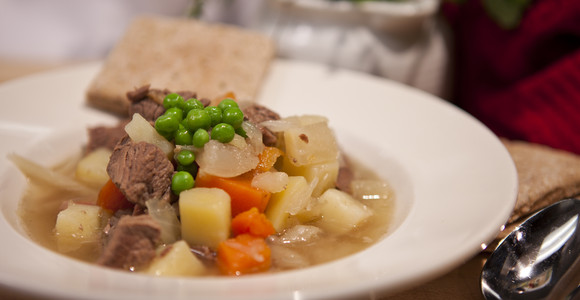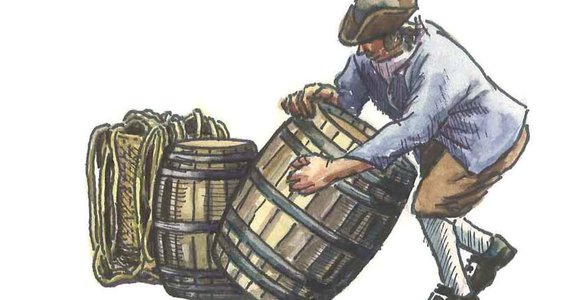Parks Canada Heritage Gourmet Recipes
Jiggs Dinner
The original recipe called for salt meat, but the chefs used plain beef and we all found it very tasty!

Origin: Ryan Premises National Historic Site
Region: Atlantic (Newfoundland and Labrador)
Period: Traditional
Course: Main Course
 Painting of man with barrels
Painting of man with barrels © Parks Canada
Jiggs Dinner is a simple meal and a cornerstone of Newfoundland outport cuisine. On a mauzy (cold, damp, raining) old day, it does the spirit well to sit down near a warm stove with a scoff of Jiggs Dinner and a cup of tea.
Originally an Irish dish, Jiggs Dinner, or salt beef and cabbage, is a staple meal of working people all over the western world, including the outport fishing families that are interpreted at the Ryan Premises and who were the backbone of the saltfish industry. This meal would have been eaten over 100 years ago when the fishing premises started operating, and is one that is still eaten regularly today as Sunday supper.
Jiggs Dinner
Ingredients:
- 4½ lbs | 2 kg beef or top butt, cut in cubes
- 4 oz | 125 g salt pork or bacon, cut in 1-inch pieces
- almost a pound | 400 g fresh turnips or rutabaga
- 1 lb | 500 g fresh carrots
- 1 lb | 500 g fresh cabbage
- 2¼ lbs | 1 kg fresh potatoes
- 4 oz | 125 g dried peas, soaked overnight in cold water (optional)
- Salt and pepper to taste
Directions:
- Place fresh water in a large pot over medium-high heat and boil the meat along with a small amount of salt pork for 45 minutes or longer. While that is boiling, prepare your vegetables.
- Cut your turnip in small pieces. Peel the carrots and potatoes and cut into medium-sized pieces. Cut the cabbage into large pieces. Add the vegetables to the pot, beginning with turnips, then the carrots and the cabbage and lastly the potatoes, allowing 15 minutes between each vegetable. Cook until the potatoes are done.
- If cooking for your own family, a cup of peas placed in a cloth and tied with a string may be hung in the pot to cook with your salt meat dinner before the vegetables are placed in.
- Ideally, the turnips, carrots, cabbage, potatoes and peas should come directly from somebody’s garden or root cellar and be washed by hand before peeling.
Credits:
Recipe tested by Chef Scott Warrick, Algonquin College School of Hospitality and Tourism
Recipe adapted from Fat-Back and Molasses: A Collection of Favourite Old Recipes from Newfoundland and Labrador, written by Ivan F. Jesperson and published by Jesperson Publishing in 2006.
Related links
- Date modified :